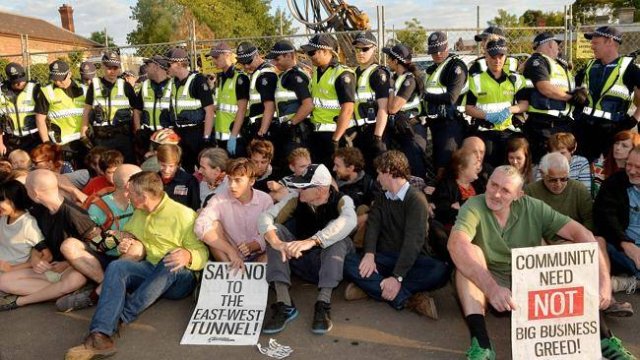
Days before the Victorian elections on November 29, the Labor opposition promised to scrap the East West Link, a massive road project in Melbourne with an estimated cost of $18 billion.
On the back of a large community campaign to stop the project, this position helped Labor win the election.
The history of the campaign to stop the tunnel provides lessons on how the community can successfully beat the power of corporations and governments.
In 2008, a study commissioned by John Brumby’s Labor government recommended an East West Link, to link the Eastern Freeway to the CityLink tollway. The Coalition government announced last year that it intended to build it, and would have contracts signed and construction begun before the state election.
At the instigation of Socialist Party councillor Steve Jolly, Yarra City Council launched a "Trains Not Toll Roads" campaign against the East West Link soon after the announcement. A public meeting on July 20 last year urged people to “engage in peaceful but determined direct action — including community pickets — to ensure this unpopular, costly and environmentally devastating toll road and tunnel is never built.”
The first picket to stop the geo-tech drilling for the East West Link was called on September 24 last year. The early morning pickets continued almost every day for six months. There were always enough people willing to turn out at 5am to stop that day’s drilling.
While there was a lot of discussion in the mainstream media about the devastating impact of the East West Link, the pickets were a reminder that it wasn’t just a debate among experts. People’s houses were on the line, and there was a strong grassroots campaign behind the pickets.
An important development was the broadening of the campaign to areas beyond the Yarra council area. A campaign for Rail to Doncaster sprang up in the eastern suburbs.
I successfully moved a motion for Moreland council to support a trains not tollroads campaign. Then I initiated a grassroots community group called Moreland Community Against the East West Tunnel (MCAT), which organised a successful local rally of 1000 people in March, as well as participating in the tunnel pickets.
When the geo-tech drilling ceased early this year, a coalition of public transport action groups formed to organise a citywide rally of 3000 people in June and another rally of about 1000 in November.
When the go-ahead for the East West Link was announced on June 30, I initiated a motion for Moreland council to take legal action against the government over the project. Yarra council voted to join the legal action and, several months later, Moonee Valley council voted to take its own legal action. Darebin council voted to support, in kind, the Moreland and Yarra legal action.
With the councils’ legal action and rising opposition to the East West Link, Labor leader (now Premier) Daniel Andrews announced in September that "Labor will honour valid and legally binding contracts, but the advice of two of Australia's most eminent commercial SCs says a contract signed weeks before Victorians vote, for a project currently under Supreme Court challenge, cannot be entered into safely."
The Labor Party would never have come to this position had the campaign not adopted a clear position from the beginning calling on Labor to commit itself to rip up any contracts signed by the Napthine government before the election. It was a major victory for the campaign of grassroots action.
While many Greens supporters have been involved in the pickets and protests and Greens politicians have spoken at all of the rallies, the Greens party did not prioritise building the grassroots community movement against the East West Link.
Another wing of the campaign is the campaign group established by the Public Transport Users Association — Public Transport Not Traffic — that focused on campaigning against the state government in marginal seats.
However, campaigning in marginal seats and would not have been enough to extract a promise from the ALP to rip up the contracts. The ALP could have correctly viewed it as a disguised method of advocating for a vote for the ALP. There would have been no pressure on them to commit to ripping up the contracts.
It was the tunnel pickets, MCAT and the community rallies that forced the Labor Party to promise to not build the tunnel.
This is the first time since the WorkChoices campaign that the ALP has been forced to make a commitment to a community movement. Mass protests forced the ALP to come out against WorkChoices, only for them to introduce "WorkChoices Lite" when in government.
The campaign against the East West Link cannot stop campaigning until the project has been decisively cancelled.
[Sue Bolton is a Socialist Alliance councillor on Moreland Council and founded the Moreland Community Against the East West Tunnel]
Like the article? Subscribe to Green Left now! You can also like us on Facebook and follow us on Twitter.